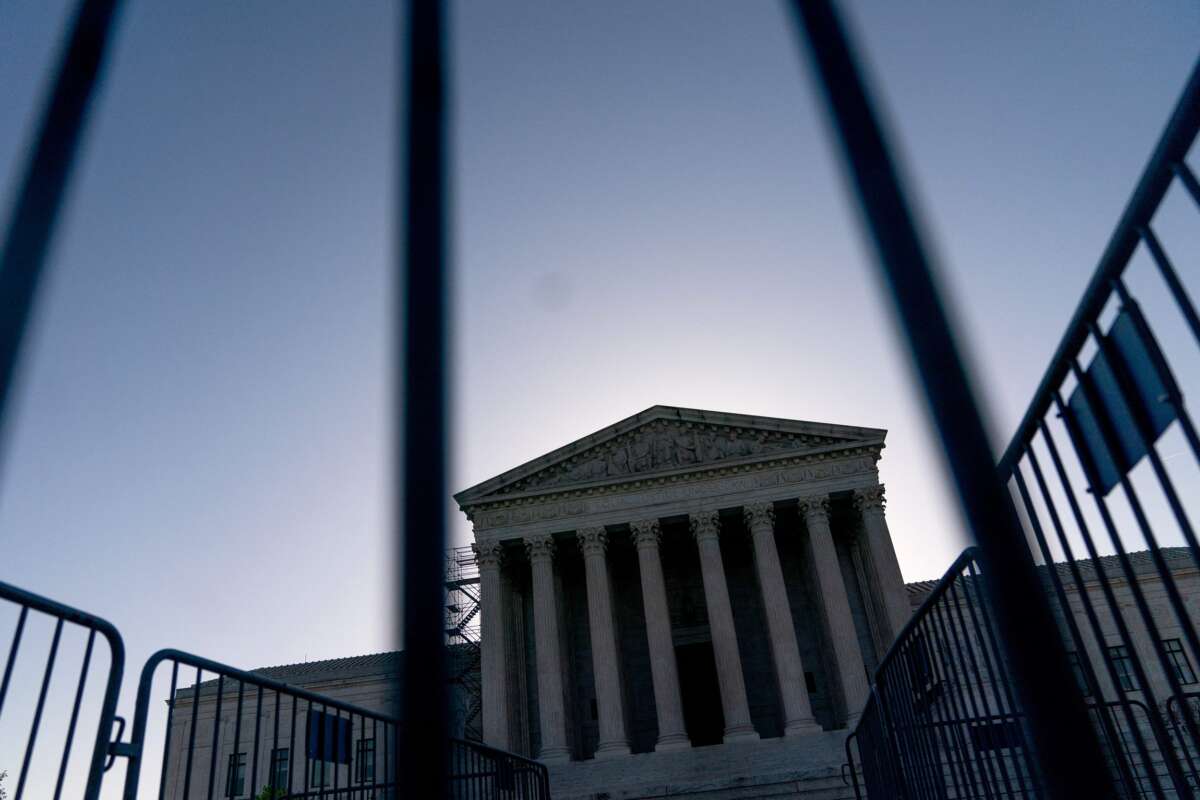Honest, paywall-free news is rare. Please support our boldly independent journalism with a donation of any size.
A new analysis from a number of law and political science professors finds that, if current trends continue, the liberal bloc of justices on the U.S. Supreme Court will remain in the minority until at least 2065, barring any immediate reforms.
The study sought to examine the potential outcomes of “court packing,” or increasing the number of Supreme Court justices beyond the current nine in order to achieve political ends.
Many political observers have said that adding justices to the Supreme Court is necessary in order to combat the Court’s extremist rightward shift in recent years due to undemocratic GOP maneuvering to rush through conservative nominees and block nominees by Democratic presidents.
The study was authored by Dan Epps and Kyle Rozema, law professors at Washington University in St. Louis; Adam Chilton, a law professor from the University of Chicago Law School; and Maya Sen, a political science professor from Harvard.
One of the paper’s key findings was that the Supreme Court’s conservative bloc will remain in power for at least the next four decades if current trends continue and lawmakers fail to implement reforms.
“Our paper uses simulations based on assumptions about the results of elections, justice retirement, etc to predict what might happen with the Supreme Court’s composition for the next century,” Epps wrote at the start of a series of tweets explaining the paper.
“Our findings have a lot of relevance for policymakers interested in Court expansion. But one particularly salient one: without Court expansion, Democrats are unlikely to retain control of the Court until…2065,” Epps added.
Epps cited Republican senators’ obstruction of nominations during the Obama administration and Justice Ruth Bader Ginsburg’s refusal to retire before her passing as instrumental in determining that the Court will likely remain under conservative control in the coming generations.
“Had RBG retired under a D president (or had Garland been confirmed),” Epps wrote, “Democrats would likely have retaken control by 2029, and would control the Court for about half of the next century.”
Judiciary observers noted that Democrats should respond to the analysis by endorsing reforms to ensure that the Court better represents the viewpoints of the American public— including increasing its size.
“I’d love to hear a Democratic senator who opposes Supreme Court expansion get asked about this study, and then watch them explain with a straight face why they’re ceding control of the Court to far-right ideologues until their grandchildren reach retirement age,” wrote Jay Willis, editor-in-chief for Balls & Strikes, a progressive website that examines the judicial branch.
If the analysis’s projections are correct, it would mean that, by the time 2065 rolls around, the Supreme Court will have been under conservative bloc control for nearly a century, as the Court has been controlled by conservatives since 1970.
Although Republicans have won just four of the past nine presidential election cycles (two of which they won without the popular vote), Republican presidents have selected seven of the past 12 Supreme Court justices since 1989.
Polls show that most Americans are open to Supreme Court reform. An AP-NORC poll published last July, for example, found that two-thirds of Americans (67 percent) backed the idea of instituting tenure limits for Supreme Court justices instead of allowing them to serve lifetime appointments. This support was bipartisan, with 82 percent of Democrats in the poll and 57 percent of Republican respondents saying they were in favor of tenure limits.
Americans also support measures to increase the size of the Court beyond its current nine members. A Marquette Law School poll published in September found that 51 percent of Americans supported expanding the Court, in spite of reservations from politicians on both sides of the political aisle in Washington.
Thank you for reading Truthout. Before you go…
…We ask that you take just a second to read this message.
We are up against a far-reaching, wide-scale attack on press freedom coming from the Trump administration. Since his inauguration last year, we’ve seen frightening censorship, a right-wing takeover of the news industry, and worsening financial conditions for progressive nonprofits across the board.
We can only resist Trump’s agenda by cultivating a strong base of support. The right-wing mediasphere is funded comfortably by billionaire owners and venture capitalist philanthropists. At Truthout, we have you.
We need your help to sustain the fight against authoritarianism in 2026. Please take a meaningful action in this fight: make a one-time or monthly donation to Truthout. If you have the means, please dig deep.
